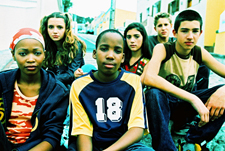YouthDecide
Philosophy

The personal relationships that vulnerable youth have, and how they manage them, play a significant role in the way their futures are formed. These same relationships are often turning points as they work to achieve life goals and to transition into adulthood. In fact, having the skills to manage healthy intimate partner relationships can make a significant difference as youth make decisions related to school, employment, pregnancy prevention, and even the forming of new relationships. These skills are especially important for youth involved in or aging out of the child welfare system and many thought leaders have come to recognize the importance of helping them succeed in this area.
However, many of the resources and curricula used to teach youth about healthy relationships were originally created with middle income youth in mind. That fact led the Annie E. Casey Foundation to invest in a series of special projects to change this reality. They initially developed pilots within two national organizations, YouthBuild and Crittenton, testing curriculums to see what adaptations were needed. The Foundation followed that work with funding to It’s My Community, to accomplish two objectives:
- oversight of a more comprehensive effort for the delivery and adaptation of relationship education for disadvantaged teens and youth of color.
- hosting meetings and developing resources to share with policy makers, funders, program operators, and intermediary organizations the need for these services to be integrated into other programs for youth.
Youth Intermediary Project

In 2010 IMCI, as an intermediary organization for the Annie E. Casey Foundation, partnered with Public Strategies and the Innovation Center for Community and Youth Development to identify and fund community-based organizations to deliver relationship education to disadvantaged youth. IMCI also provided training, technical assistance, and documentation of the lessons learned by these grantees to further the field of youth relationship education.
Grant-funded services were offered to those who: had been in the child welfare system, were pregnant/parenting teens, were currently in a juvenile justice detention facility, or were engaged in a broader, positive youth development program offering other life and education-focused skills. Services were offered to young people, ages 14 to 20, found in a variety of settings—community programs, schools, or various systems such as juvenile detention centers. Funded organizations included:
- Boys and Girls Club of Greater Milwaukee – serving high school students in disadvantaged communities during the eighth hour of the school day (Milwaukee, WS)
- Memphis Urban League - serving high school students in disadvantaged communities in an after-school program (Memphis, TN)
- YMCA of Metro Detroit – serving high school students as part of their Future Young Professionals program (Detroit, MI)
- Girls Inc.(Denver, CO) – serving girls in the juvenile justice system
- Catholic Charities– serving pregnant/parenting teens, afterschool with Urban League, and homeless young women (Wichita, KS)
- Mile High United Way - serving young people who have been in the child welfare system and boys in the juvenile justice system (Denver, CO)
The lessons learned working directly with these youth directly informed meetings and resources designed to move the fields of relationship education, positive youth development and other youth-focused programming forward in partnerships certain to better meet the needs of disadvantaged and youth of color.
Putting Youth Relationship Education on the Child Welfare Agenda

IMCI has spent several years overseeing a multi-tiered process designed to engage interest and support for providing relationship education to child-welfare-involved youth. This work includes facilitating meetings with key child welfare and relationship education experts, strategic thinkers, program operators, youth, philanthropists, and government leaders to highlight existing research, identify gaps, and present opportunities to offer relationship education to vulnerable youth currently or formerly engaged in the child welfare system. These discussions have informed the work of PSI, manager of the National Healthy Marriage Resource Center, resulting in a series of products used by IMCI and others. The documents below represent a report developed by Child Trends on behalf of IMCI and the Annie E. Casey Foundation that provides a model of change and reviews the research and evaluation evidence on relationship education for foster care youth; discusses the needs of disadvantaged young people around intimate partner relationships; summarizes research on the implications of relationships for child development; identifies common ground and also gaps in the research; and makes recommendations about opportunities to further improve relationship skills among these disadvantaged youth.
Providing Relationship Education to Foster Care Youth
More than a quarter of a million children enter foster care each year in the United States and many of these children have witnessed or experienced domestic violence. Children exposed to unhealthy relationships often suffer from post-traumatic stress disorder, passivity or withdrawal, and aggressive behavior and the experience dramatically increases their risk of getting involved in unhealthy relationships themselves. Foster care youth are also at higher risk of teenage pregnancy and prostitution. This report provides tips to aid relationship educators and practitioners in helping youth in foster care build the skills to develop and maintain healthy romantic relationships.
http://www.healthymarriageinfo.org/resource-detail/index.aspx?rid=3879
Relationships Matter: Strategies for Practitioners Talking with Youth about Intimate Relationships

Romantic relationships are an important part of life for teens and young adults. Patterns and habits formed as adolescents can affect later adult relationships. This presentation provides strategies for practitioners to talk with youth about intimate relationships.
http://www.healthymarriageinfo.org/resource-detail/index.aspx?rid=3740
Relationships Matter: Partnering to Prevent Unplanned Pregnancy
Policymakers are thinking about relationship education as part of their teen pregnancy prevention strategies. For example, in March 2010, health reform legislation recognized relationship education as part of the pregnancy prevention programs. Similarly, the federal State Personal Responsibility Education Program (PREP) included relationship education as one the “adulthood preparation subjects” that was allowable through that funding opportunity. With these opportunities in mind, and funding from the Annie E. Casey Foundation, the National Healthy Marriage Resource Center and the Innovation Center for Community and Youth Development convened a group of policy and program leaders with expertise in teen pregnancy prevention and relationship education in the fall of 2010 in Denver to discuss the latest practices, research, and opportunities to support the integration of relationship education and pregnancy prevention services as a strategy for meeting the needs of vulnerable youth.
http://www.healthymarriageinfo.org/resource-detail/index.aspx?rid=3992
Relationship Education and Pregnancy Prevention: What's the Connection?
Children who grow up in single-parent families are more likely to be poor, have trouble in school, and become teen parents themselves. Additionally, children who are born to a mother who is a teenager, who hasn’t finished high school, and who isn’t married are nine times more likely to be poor than a child whose mother is even a few years older, is married and has at least finished high school. Thus, strengthening families through both teen pregnancy prevention (TPP) and marriage and relationship education (MRE) programs is an effort to decrease out-of-wedlock childbearing and increase the percentage of children born to and raised by their married parents. This tip sheet highlights the connection between MRE and TPP programs and offers strategies for enhancing services.
http://www.healthymarriageinfo.org/resource-detail/index.aspx?rid=3724
Youth and Healthy Relationships Collection by Topic

The majority of young people of both sexes say that "having a good marriage and family life is ‘extremely important' to them." Yet, far too many youth have low expectations of ever experiencing a healthy romantic relationship or marriage. This collection provides research and resources regarding this issue.
http://www.healthymarriageinfo.org/resource-detail/index.aspx?rid=3653
Relationships Matter: Strengthening Vulnerable Youth. Proceedings Summary.
This report summarizes the proceedings of a conference held at the Airlie Conference Center in Warrenton, Virginia, October 5-7, 2009, that brought together 35 leaders and practitioners from the youth development and relationship education fields to discuss the needs of disadvantaged youth and the capacity of the field to deliver relationship education to these young people. Key themes from the conference are discussed and include: relationship education is essential and youth leaders and practitioners broadly agreed that the need for relationship education in youth work is apparent; relationship education is a development strategy and healthy intimate partner relationships can have a positive impact on young people's lives; relationship education is focused on skill building, interpersonal skills, safety, knowing oneself, and setting the stage for healthy marriage; youth should have a holistic understanding of relationship education, recognizing both benefits and challenges; relationship education is not just an outcome and youth development professionals can model healthy relationships as well as teach relationship skills; relationship education may be delivered as a curriculum and through an experiential learning model, and these strategies may be stand-alone programs or integrated into the spectrum of youth development services; and there is no one-size-fits-all approach to delivering relationship education to youth—the content and service delivery method must resonate with the youth you are trying to reach. Implications of the themes for practice and next steps are discussed.
http://www.healthymarriageinfo.org/resource-detail/index.aspx?rid=3262
Putting Youth Relationship Education on the Child Welfare Agenda: Findings from a Research and Evaluation Review
The documents below represent a report developed by Child Trends on behalf of IMCI and the Annie E. Casey Foundation that provides a model of change and reviews the research and evaluation evidence on relationship education for foster care youth; discusses the needs of disadvantaged young people around intimate partner relationships; summarizes research on the implications of relationships for child development; identifies common ground and also gaps in the research; and makes recommendations about opportunities to further improve relationship skills among these disadvantaged youth.
Executive Summary | Literature Review | PowerPoint
Youth Relationship Education and Vulnerable Youth: A Practitioner’s Perspective
A perspective paper on relationship education written by a practitioner with years of experience working with vulnerable youth.
http://www.itsmycommunity.org/images/youth-relationship-education-and-vulnerable-youth.pdf

As an intermediary organization and a thought leader for the Annie E. Casey Foundation, IMCI has developed partnerships to explore research, convene youth develop organizations, establish best practices, and execute funding/training for community organizations across the country committed to engaging disadvantaged youth and youth of color in the development of healthy relationships, knowing that their relationship choices often have life-long impacts.
